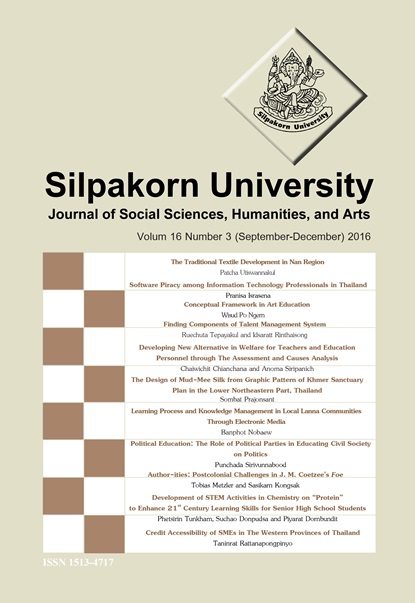Author-ities: Postcolonial challenges in J. M. Coetzee’s Foe
Main Article Content
Abstract
J. M. Coetzee’s 1986 novel Foe is a postcolonial reworking of Daniel Defoe’s Robinson Crusoe. The novel differs from other examples of postcolonial writing back that undermine canonical authority by way of constructing alternative narratives and seeking to reassign agency to the deprived and marginalized subjects of colonialism. Coetzee shifts the focus away from the level of competing narratives to an alternative account of the genesis of the canonical text itself. The article argues that Coetzee produces a postcolonial critique of a second order by weaving together intertextual and metafictional elements. At the centre of this project stands the question of authorship. The struggle for authorial authority between the novel’s multiple author figures lays bare the structures of power and repression at work in the creation of colonialist literature by drawing attention to the acts of omission and silencing in its wake.
Downloads
Article Details
All rights reserved. Apart from citations for the purposes of research, private study, or criticism and review,no part of this publication may be reproduced, stored or transmitted in any other form without prior written permission by the publisher.
References
Attwell, D. (1990) The Problem of History in the Fiction of J. M. Coetzee. Poetics Today 11(3): 579–615.
Attwell, D. (1993) J. M. Coetzee: South Africa and the Politics of Writing. Berkeley: University of California Press.
Attwell, D. (2012) J. M. Coetzee and South Africa: Thoughts on the Social Life of Fiction. English Academy Review 29: 174–186.
Bhabha, H. K. (2004) The Location of Culture. London and New York: Routledge.
Caracciolo, M. (2012) J. M. Coetzee’s Foe and the Embodiment of Meaning. Journal of Modern Literature 36(1): 90–103.
Coetzee, J. M. (1987) Foe. New York and London: Penguin Books.
Coetzee, J. M. (1992) Doubling the Point: Essays and Interviews (D. Attwell Ed.). Cambridge, Mass and London: Harvard University Press.
Coetzee, J. M. (2003a) He and His Man: Nobel Lecture. [Online URL: https://www.nobelprize.org/nobel_prizes/literature/laureates/2003/coetzee-lecture-e.html] assessed on December 12, 2015.
Coetzee, J. M. (2003b) Nobel Lecture by J. M. Coetzee. [Online URL: https://www.nobelprize.org/mediaplayer/?id=555] assessed on December 12, 2015.
Defoe, D. (1719) The Life and Strange Surprizing Adventures of Robinson Crusoe of York, Mariner: Who lived Eight and Twenty Years, all alone in an un-inhabited Island on the Coast of America, near the Mouth of the Great River of Oroonoque; Having been Cast on Shore by Shipwreck, wherein all the Men perished but himself. With an Account how he was at last as strangely deliver’d by Pyrates. Written by Himself. London: W. Taylor.
Defoe, D. (2007) Robinson Crusoe (T. Keymer Ed.). Oxford and New York: Oxford University Press.
Derrida, J. (2011) The Beast and the Sovereign (Vol. II). Chicago: The University of Chicago Press.
Dovey, T. (1987) Coetzee and His Critics: The Case of Dusklands. English in Africa 14(2): 15–30.
Gauthier, M. (1997) The Intersection of the Postmodern and the Postcolonial in J. M. Coetzee’s Foe. English Language Notes 35(4): 52–71.
Head, D. (1997) J. M. Coetzee. New York: Cambridge University Press.
Head, D. (2009) The Cambridge Introduction to J. M. Coetzee. Cambridge and New York: Cambridge University Press.
Hutcheon, L. (1988) A Poetics of Postmodernism: History, Theory, Fiction. New York: Routledge.
Kossew, S. (1996) Pen and Power: A Post-Colonial Reading of J. M. Coetzee and André Brink. Amsterdam and Atlanta, GA: Rodopi.
Lane, R. J. (2006) The Postcolonial Novel. Cambridge and Malden, Mass: Polity.
Loomba, A. (2005) Colonialism/ Postcolonialism (2nd ed.). London and New York: Routledge.
Maher, S. N. (1991) Confronting Authority: J. M. Coetzee’s Foe and the Remaking of Robinson Crusoe. The International Fiction Review 18(1): 34–40.
Marais, M. (1989) Interpretative Authoritarianism: Reading/Colonizing Coetzee’s “Foe”. English in Africa 16(1): 9–16.
Mc Leod, J. (2010) Beginning Postcolonialism (2nd ed.). Manchester: Manchester University Press.
Parry, B. (1996) Speech and Silence in the Fictions of J. M. Coetzee. In Critical Perspectives on J. M. Coetzee, edited by G. Huggan and S. Watson, pp. 37–65. London and New York: Macmillan Press.
Phillips, R. (1997) Mapping Men and Empire: A Geography of Adventure. London and New York: Routledge.
Poyner, J. (2009) J. M. Coetzee and the Paradox of Postcolonial Authorship. Farnham, Surrey and Burlington, Vt.: Ashgate.
Roberts, S. (1991) “Post-Colonialism, or the House of Friday“ — J. M. Coetzee’s Foe.
World Literature Written in English 31(1): 87–92.
Spivak, G. C. (1990) Theory in the Margin: Coetzee’s Foe Reading Defoe’s “Crusoe/Roxana”. English in Africa 17(2): 1–23.
Thieme, J. (2001) Postcolonial Con-Texts: Writing Back to the Canon. London and New York: Continuum.
Tiffin, H. (1987) Post-Colonial Literatures and Counter-Discourse. Kunapipi IX(3): 17–34.
Turk, T. (2011) Intertextuality and the Collaborative Construction of Narrative: J. M. Coetzee’s Foe. Narrative 19: 295–310.
Watt, I. P. (1957) The Rise of the Novel: Studies in Defoe, Richardson, and Fielding. Berkeley: University of California Press.


